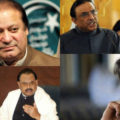
Bhagat Singh was one of the greatest revolutionaries to step out of the Indian Sub-continent against the British Raj. Bhagat was a very young boy when the British took over. His earliest memories are of his father being in prison due to his political activities. This led to Bhagat being very politically aware from a very young age.
The exposure of Bhagat Singh to revolutionary politics at such a young age automatically pushed him to involve himself in what was going around in the country

Bhagat’s father was a supporter of Mahatma Gandhi and actively participated in political campaigns alongside him. Young Bhagat also took part in the non-cooperation movement by burning government sponsored books. This shows that Bhagat grew up in an environment which was not only critical of the British but he also saw how the British used force against innocent people to maintain their control over their resources, their land, and their lives. He grew in an environment where the colonialists were slowly taking over the culture, the language, the societal norms and forcing people to adopt ideas which were very English in nature.
Foreign invasions impact the people of the land and enhance feelings of resentment and revenge, especially when the affectees are young
When colonizers take over a land with such a rich culture and traditions, it is bound to agitate the people especially when they use force. This is how rebels are born because they are not ok with the idea that foreigners can dictate how they should be instead of allowing the space to them to grow. Due to the authoritative style of governance of the British, Bhagat left school and joined National College. This is where he studied European revolutionary movements and that had a great impact on who he was as a person and strengthened his resolve to act against the foreigns who had forcefully occupied his land.

Incidents of violence reinforce that might is right and that is what a very large population of the sub-continent grew up witnessing
Bhagat’s political outlook was shaped by two very important incidents which showed how the British mercilessly forced the Indians to follow them. The first incident was the Jallianwala Bagh massacre in 1919. This was a time when the British had implemented Section 144 of the Penal Code. According to Section 144, people no longer have the right to assembly and any group of four or more people can face fines and imprisonment. The locals went to the Jallianwala Bagh to celebrate the “Besakhi Mela” and these people belonged to different faiths. The government saw this as a violation of Section 144 and General Dyer commanded his regiment to open fire at the people celebrating the mela. Many innocent lives were lost that day and this particular incident angered many.
The second incident which Bhagat found very unfair was the killing of the unarmed Akali protestors at the Nankana Sahib in 1921. This triggered agitation from the locals in all parts of India, especially Gujranwala where the British had to resort to aerial firing to control the protestors.

The lack of political spaces for the locals pushes them to become militarized rather than seeking political solutions to their problems
Mahatma Gandi at that point was a very significant political figure who revolted against the British but soon called off the non-cooperation movement after realizing that lives were being lost and the British had an upper hand in war mechanisms. But Bhagat had spent a lifetime witnessing this violence and terrorizing of his people that he was convinced of violent insurgency against the British.
His strong belief in violent insurgency was reinforced when Lala Lajpat Rai, who was a prominent revolutionary figure, was brutally injured in an attack by the police and he succumbed to his injuries a few days later. Bhagat and his fellow comrades, Sukhdev and Rajguru, planned to take revenge of the death but ended up shooting a new officer (Saunders), who had replaced Squat – the officer who killed Lala Lajpat Rai. A case was registered against them and on October 7, 1930, the Tribunal found them guilty of Sauder’s murder.
On March 23, 1931, Bhagat Singh was hanged till death along with his comrades Sukhdev and Rajguru.

There is a need to create spaces for groups that have been alienated by governments which use state terrorism to control the people
The story of Bhagat is tragic because he did not have the majority on his side, who were ready to engage in a violent insurgency. The common man is always in fear of losing his life and that isolates revolutionaries who engage in such politics. According to Professor Ishtiaq Ahmed, Bhagat Singh’s politics was part right and part wrong. His friends wrote an article on self-criticism, where they realized that revolutionary terrorism is not the answer to attain political changes.
The solution lies in collective efforts on part of the marginalized groups. At the same time, it is also important for governments who are obliged by the Human Rights Charter of the United Nations, to provide political spaces to agitated groups because alienating them almost always means the group will take up arms. And we have witnessed successive examples of that throughout the course of history.
Take this poll to tell us what you think of Bhagat Singh and his politics!





